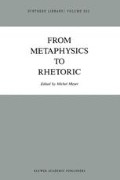Abstract
The term “dialectic” is one of those words which philosophers have not stopped making use of since Antiquity, enriching it with such a variety of meanings that today, when we go to use it, we are deeply troubled. In Aristotelian terminology, it has become a plurivocal or equivocal term, a pollachôs legomenon. It is henceforth easy to understand that at the moment when contemporary philosophy undertook a spectacular return to Aristotelian methodology, it was very scrupulous in its use of it. These scruples are most clearly exemplified by Chaïm Perelman who, when he introduced the “new rhetoric” with L. Olbrechts-Tyteca, preferred to eliminate it from the theory of argumentation.1 Moreover, it is in this context that argumentation subsequently developed, claiming, as it did, to go beyond the field of rhetoric.
Access this chapter
Tax calculation will be finalised at checkout
Purchases are for personal use only
Preview
Unable to display preview. Download preview PDF.
Notes
Ch. Perelman and L. Olbrechts-Tyteca, La nouvelle rhétorique. Traité de l’argumentation, Vol. 1, Paris, 1958, pp. 1–13, esp. pp. 6–8.
Ch. Perelman, «La methode dialectique et le rôle de l’interlocuteur dans le dialogue», Entretiens philosophiques d’Athènes, Athens, 1955, pp. 179–183.
And when it does appear, it does so in an altogether different context.
The New Rhetoric, p.7
This absence is already significant on its own, and allows us to understand, at least partially, the orientation that the “new rhetoric” takes: dissimulating, as we shall see, the critical part of the Aristotelian dialectic.
Once again the use of the term antistrophos registers a distance in the correspondence (Rhet. I.1.1354a.1) — which is limited, as we shall see, to the syllogistic character of rhetoric and by which Aristotle’s rhetoric ensures its difference with the preceding rhetorics.
Cf. Top. I.12.105a.10–19. See also our study «Y a-t-il une intuition des principes chez Aristote», Revue Internationale de Philosophie, 133–134, 1980, pp. 440–471.
Rhet., I.2.1356a.34–b27.
Ibid., 1357b.26–36.
On this question, Aristotle sometimes speaks of a difference governed by proairésis.
On the meaning to assign to the endoxon, see our study «Dialectique et philosophic chez Aristote», πιλοσοϕια, 8–9, 1978–1979, pp. 229–256, 231–232, where we speak of a “statement containing some value” or of a “generally accepted consideration”.
On this question, see Pierre Hadot, «Philosophic, Dialectique, Rhétorique dans l’antiquité«, Stadia Philosophica, 39, 1980, pp. 139–166, 140–146, who nonetheless loses sight, as moreover most interpreters of Aristotle do, of the “critical” aspect of dialectic.
Cf. our study «Dialectique et philosophic chez Aristote», cited above, pp. 231–235.
See our study «Le problème de la proairisis chez Aristote», Annales de l’Institut de Philosophie de l’U.L.B., 1972, pp. 7–50.
On the matter of agônistikè see in particular Top. VII.5.
The importance of the learned man was first noted by P. Aubeneque, Le problème de l’être chez Aristote, Paris, 1962, Ch. III. As far as the limits of this interpretation, see our article «Dialectique et Philosophie chez Aristote», op. cit., pp. 238 ff.
Reported thus in the Politique.
Cf. our study «Sophisma et Philosophia chez Aristote», Annales de l’Institut de Philosophie de l’U.L.B., 1978, pp. 7–38.
See our article «Dialectique et philosophie chez Aristote», op. cit., pp. 231 ff., where an analysis of the meaning and scope of this essential passage from Aristotle will be found.
See N°. 11 below.
Here it is a matter of a crucial point in Aristotelian dialectic: which we have established in our «Dialectique et philosophie chez Aristote», op. cit.
Indeed, we cannot lose sight of the fact that, for Aristode, refutation is an inference which is contradictory to the beginning argument (Ref. Soph. 2.165a.38ff.; 6.168a.36ff.; 10.171a.195, etc.).
See again «Dialectique et philosophie chez Aristote», op. cit.
Here we are paraphrasing the passage between 167b.1 and b.20.
Cf. J. Tricot, In ref. soph. (J. Vrin), p. 20 n.2.
Top.I.1.100b.21–23.
I here paraphrase Ch. Perelman, «La méthode dialectique et le rôle de l’interlocuteur dans le dialogue», op. cit., p. 181.
On this subject, see how he emphasizes his aporetic method in Métaph. B.1.
Cf. E. Berti, «Aristote et la méthode dialectique du Parménide de Platon», Revue Internationale de Philosophie, 133–134, 1980.
Cf. L’avènement de la science physique. Essai sur la Physique d’ Aristote, Brussels, 1980, pp. 131 ff., where we develop this problem in a more detailed manner.
Ibid., pp. 139 ff.
This study begins in Phys. I.7, along the lines of an analysis of general becoming and ends in the institution of the principles of becoming according to the ousia. See our book, cited above, pp. 154ff.
Ibid.,pp. 191 ff.
See our study «Dialectique et philosophic chez Aristote», op. cit., pp. 243 ff.
Ch. Perelman, «La méhode dialectique et le rôle de rinterlocuteur dans le dialogue», op. cit., p. 181.
Even if this knowledge established by the critique of preceding opinions and by the implementation of new methodological data appears retrospectively to be a new “opinion”.
It is moreover significant that while histories of rhetoric are prevalent today, the history of dialectic is still neglected — in particular with regard to its critical aspect and its dogmatization repeated by various philosophical currents.
Editor information
Editors and Affiliations
Rights and permissions
Copyright information
© 1989 Kluwer Academic Publishers
About this chapter
Cite this chapter
Couloubaritsis, L. (1989). Dialectic, Rhetoric and Critique in Aristotle. In: Meyer, M. (eds) From Metaphysics to Rhetoric. Synthese Library, vol 202. Springer, Dordrecht. https://doi.org/10.1007/978-94-009-2593-9_8
Download citation
DOI: https://doi.org/10.1007/978-94-009-2593-9_8
Publisher Name: Springer, Dordrecht
Print ISBN: 978-94-010-7672-2
Online ISBN: 978-94-009-2593-9
eBook Packages: Springer Book Archive

